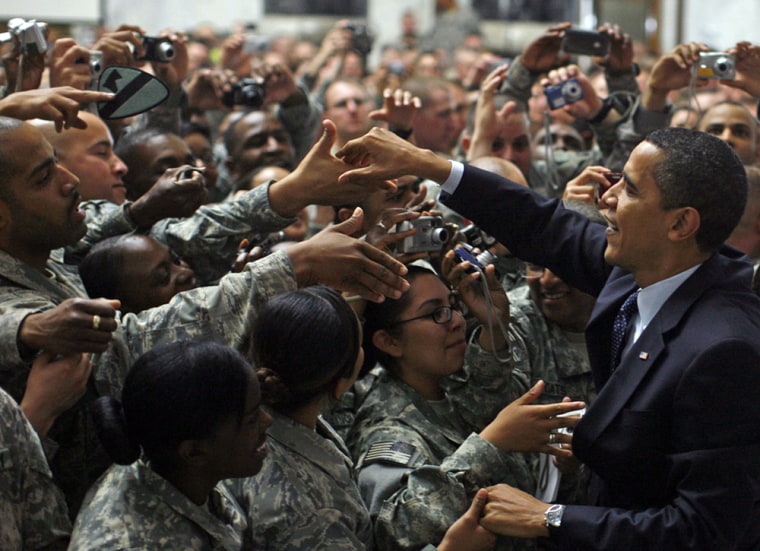Within a week of taking office, President Barack Obama had called his top national security officials and military brass together at the White House for an urgent meeting on a single subject — Afghanistan.
American casualties were at their highest levels of the war. The Taliban was gaining strength. Pakistan had done little to eliminate the Taliban and al-Qaida safe havens across the border.
After each of the top advisors laid out their outlook for the war, the president scanned the room and asked what would seem to be the obvious question, "What is the end game?"
In other words, for the United States, how does this war end? When no one could provide him a satisfactory answer, Obama ordered a full scale review and a new strategy that included both Afghanistan and Pakistan.
Saddled with two wars, with little or no military contact or experience, President Obama appeared determined to provide the kind of decisive leadership that the situations demand. But how radically different would his policies be from the Bush administration?
Time to start coming home
A little more than a month after taking office, President Obama stood before battle-hardened Marines at Camp LeJeune, N.C., and told them it was time to start coming home from Iraq.
"Let me say this as plainly as I can: by August 31, 2010, our combat mission in Iraq will end," Obama declared.
Under Obama's plan, that would leave up to 50,000 U.S. military forces on the ground to hunt down remnants of al-Qaida, assist the Iraqi military, and protect the diplomats and civilians serving in the U.S. embassy in Baghdad.
That's not much different than the long-range plans of the military under the Bush administration, and well short of Obama's original campaign promise to pull all U.S. troops out of Iraq.
But now as commander in chief, his responsibilities extend well beyond his political constituents. And as we've so painfully learned in more than 6 years of the war in Iraq, no original battle plan, and certainly no timetable, survives the first encounter with the enemy.
A hedge
Gen. Ray Odierno, the top U.S. military commander in Iraq, had already asked to keep the current level of about 130,000 American forces in Iraq until after the Iraqi national elections in December. This was a hedge against any possible spike in violence.
But Odierno didn't have to wait that long.
Within the past week alone, scores of Iraqi civilians have been killed in a series of suicide bombings. As a result, the U.S. and Iraq are already planning to delay the withdrawal of all U.S. forces from Iraqi cities by the end of June, essentially putting off the first critical step toward a total withdrawal.
In a Baghdad visit this past weekend, Secretary of State Hillary Clinton promised Iraqis the U.S. will not desert them as it starts to pull out troops, declaring "The United States will stand with the people of Iraq."
So despite President Obama's pledge that the combat mission in Iraq will end by August 2010, it does not rule out the very real possibility that some number of American forces will still be fighting beyond that deadline.
In his Camp LeJeune speech to Marines, even President Obama cautioned, "There will surely be a difficult period" that will result in what he called, "tactical adjustments."
A 'war we must win'
The President's ambitious strategy for Afghanistan faces even more daunting challenges.
Having declared that the war against the Taliban and al-Qaida in both Afghanistan and Pakistan is "a war we must win," Obama ordered a major shift in America's focus from Iraq to Afghanistan. Following the strategy review, Obama agreed to deploy an additional 21,000 soldiers and Marines to Afghanistan. At the same time Obama ordered a "civilian surge" of non-military U.S. government employees to help rebuild and stabilize the Afghan government.
Recognizing that no strategy in Afghanistan can succeed without eliminating the growing threat from the Taliban and al-Qaida safe havens in Pakistan, President Obama pledged billions of dollars in military aide to the struggling Pakistani government.
But after the government in Islamabad granted the Taliban the right to impose the strict, Islamic fundamentalist Shariah law in the SWAT valley, Secretary Clinton last week accused the Pakistani government of "abdicating to the Taliban and extremists," and declared Pakistan a "mortal threat" to the United States.
In these first 100 days of the Obama administration, senior Pentagon and military officials generally give Obama high marks, not only for his decisiveness, but also for his flexibility and willingness to alter his course if necessary. According to one senior military official, "He listens."
But he has yet to be tested. And when the wars in Iraq and Afghanistan present inevitable challenges and demands, ultimately it will be up to President Obama to provide the answers.
